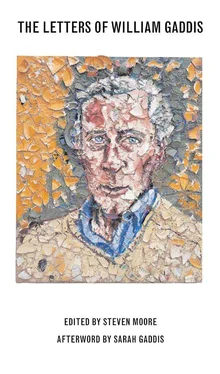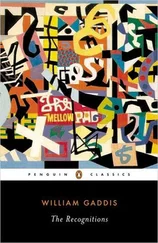Wainscott
2 March 94
Dear Michael Millman—
Candida has forwarded to me your letter regarding the new book & the shortfall on the 2 old ones—“puzzled” at how few copies of those have been ordered by bookstores recently — but why “puzzled”? When ½ the country thinks they’re still out of print and — as you observe yourself — need ads to remind them of the new epiphanies. Along these lines I enclose my letter to “my editor” at S&S (not yet acknowledged)—
What seems such a damned shame in both cases is the marvelously successful effort that went into making the books themselves — yours with the 2 ‘classics’, covers (which should have so splendidly framed even a small ad) &c, & the designers compositors copyreaders &c at S&S producing such a marvelous ‘product’ & after that everyone collapsing (you may have seen the off register “colour” ½ page in the Times BR —I ask you!).
best regards,
W. Gaddis

To Gregory Comnes
[ Comes had written to ask (1) if WG would autograph his copy of FHO , and (2) if WG had received his Ethics of Indeterminacy . This note is undated and lacks a salutation. ]
Wainscott, New York 11975
[March 1994]
NEW (for me) WORD: APORIA (from a Gertrude Himmelfarb rvw)
“difference, discontinuity, disparity, contradiction, discord, ambiguity, irony, paradox, perversity, opacity, obscurity, anarchy, chaos”
LONG LIVE!
1) Surely, send the book for signing
2) I have your (signed) book & thank you
3) I have your note with it & don’t know what you mean with “all & sundry are busy complimenting me on the caustic comment made about my book” This is Jonathan Raban?
Ah!
Gaddis

Himmelfarb rvw: the word and definition are from Michiko Kakutani’s review of historian Gertrude Himmelfarb’s book On Looking into the Abyss in the New York Times , 1 March 1994, C19.
Raban: in the opening paragraph of his review of FHO in the New York Review , Raban refers to “the professional Gaddisites, a solemn crew themselves given to sentences like ‘Read from this perspective, The Recognitions demonstrates the essential alterity of the world, the meta-ethical virtue of agapistic ethics’” (from p. 49 of Comnes’s book).

To John Updike
[ American novelist and critic (1932–2009) who, like WG, attended Harvard (class of ’54) and wrote for the Lampoon.]
Wainscott, New York 11975
13 March 1994
dear Reverend John,
how is it that we who have so desperately sought to rescue/impose order seem in the summing up to have led the most disorderly of lives? Your letters (now & a couple of years ago) breathe a kind of self contentment — longlasting wife, real estate, retirement work — which I gave up on long ago & which may point to our essentially opposite orientations: yours grounded on absolutes (as you’ve demanded from the start) vs. my attempt to “provide an honest vision of an essentially indeterminate landscape a postmodern world without absolutes” &c (v. Comnes, The Ethics of Indeterminacy in the Novels of W*G* , Univ. Florida Press 1994) for which I learn a new word “aporia” from a review of a theoretical opponent named Himmelfarb (sic) meaning “discontinuity, disparity, contradiction, discord, ambiguity, chaos” (she’s against it). Of course you have borne a tragedy which may only have confirmed your stance (like the patriotic parents who lost sons in Vietnam) either of which I am sure would have destroyed me confirming my stance. Think not the struggle naught availeth &c. . Or is another word for it ‘romantic’ re your account of Mowery of whom I lost track long ago, or Bill Davison, d[itt]o. Dear old Barney Emmart, diabetic & other illnesses but I think finally a spirit severely damaged following a very bad mugging in Spain, a man of such wit & tenderness & a great loss dead as he was while still alive. Jacob Bean too who of course started off in the Divinity School &, in a manner of speaking, returned to it toward the end in an alcoholic haze of devout P.E. devotions as blindness overtook him, a gentleman in the most generous sense of the word. Thus regarding ‘our 50th’ D.V. but I doubt that I am, since I feel so strongly that it is not the college I went to but from their relentless mailings (inc. H* Magazine ) has become a vast selfpromoting multinational corporation with [ gap in manuscript ] & no place whatsoever for me.
Like yourself I have had the body’s plumbing & electrical functions refurbished & am now casting about through the vast store of detritus those 4 books have left behind to see whether there lurks somewhere another ‘wanting to be written’ (as Samuel Butler had it), nearer I fear to Flaubert than I ever knew.
[unsigned fax]

you have borne a tragedy: perhaps a reference to the death of Updike’s mother in 1989.
Think not the struggle: the opening line of Arthur Hugh Clough’s once-popular poem of encouragement, “Say Not the Struggle Naught Availeth” (1855; ODQ ).
Mowery: unidentified.
Bill Davison: the man WG drove to Mexico with in 1947.
P.E.: elsewhere WG uses this abbreviation for Protestant Ethic.

To Polly Roosevelt
[ The wife of a CIA officer (the grandson of Theodore Roosevelt), Ms. Roosevelt was born Mary Lowe Gaddis; she apparently saw WG’s interview in the Washington Post and wrote to see if they were related. ]
Wainscott, New York 11975
14 March 1994
Dear Ms. Roosevelt.
Thank you for writing: I too am just into my 70s & so understand the haste involved & only wish I could be of more help regarding your inquiry.
In fact I can really be none at all. Had you asked about my mother’s side (Williams, Hough, Meredith &c) I could have gone on chapter & verse, largely Quaker stock moving from the Carolinas to Indiana in one of those schisms before the Civil War & gradually drifting back to the East Coast, my mother age about 18 to a brief college career at Sweetbriar & thence to New York where she met this dashing fellow & married at 22 & he wasn’t much older in the high spirits of the 20s, little fliers on Wall Street (where he overworked) which seemed to go on theatre tickets & finally a breakdown & they separated when I was about 3 brought up by my mother’s family & I didn’t see him again until I was in my 20s when we got reacquainted or I should say acquainted but I never did pursue his lineage with him, thought it was largely Scotch Irish (as much also on my mother’s side with England & Wales) but met his ancient mother who was German Catholic which I later understood hadn’t set too well with the Williams side, recalling an equally ancient thee-&-thou great aunt of mine whose visits east from Fountain City Indiana in the 30s we would try to spark with trips up to the Roosevelt shrine at Oyster Bay (we lived on the South Shore) & there, I’m afraid, I must leave you.
Читать дальше














